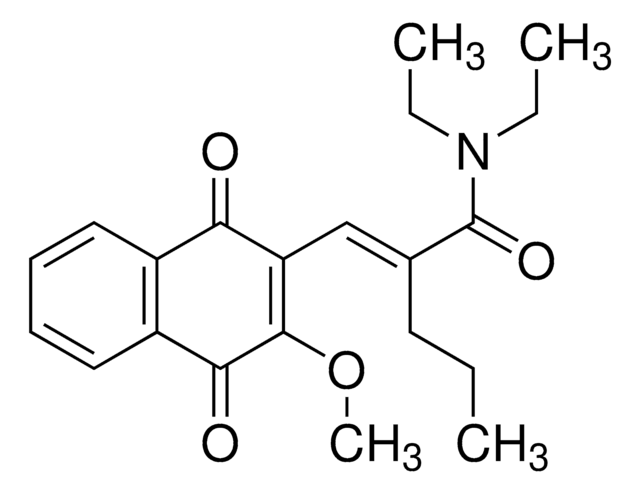E8534
E3330
≥98% (HPLC)
Synonyme(s) :
(2E)-2-[(4,5-Dimethoxy-2-methyl-3,6-dioxo-1,4-cyclohexadien-1-yl)methylene]-undecanoic acid
About This Item
Produits recommandés
Niveau de qualité
Pureté
≥98% (HPLC)
Forme
powder
Couleur
red to orange
Solubilité
DMSO: >20 mg/mL
Température de stockage
2-8°C
Chaîne SMILES
CCCCCCCCC\C(=C/C1=C(C)C(=O)C(OC)=C(OC)C1=O)C(O)=O
InChI
1S/C21H30O6/c1-5-6-7-8-9-10-11-12-15(21(24)25)13-16-14(2)17(22)19(26-3)20(27-4)18(16)23/h13H,5-12H2,1-4H3,(H,24,25)/b15-13+
Clé InChI
AALSSIXXBDPENJ-FYWRMAATSA-N
Application
Actions biochimiques/physiologiques
Mentions de danger
Conseils de prudence
Classification des risques
Aquatic Chronic 4
Code de la classe de stockage
11 - Combustible Solids
Classe de danger pour l'eau (WGK)
WGK 3
Point d'éclair (°F)
Not applicable
Point d'éclair (°C)
Not applicable
Certificats d'analyse (COA)
Recherchez un Certificats d'analyse (COA) en saisissant le numéro de lot du produit. Les numéros de lot figurent sur l'étiquette du produit après les mots "Lot" ou "Batch".
Déjà en possession de ce produit ?
Retrouvez la documentation relative aux produits que vous avez récemment achetés dans la Bibliothèque de documents.
Notre équipe de scientifiques dispose d'une expérience dans tous les secteurs de la recherche, notamment en sciences de la vie, science des matériaux, synthèse chimique, chromatographie, analyse et dans de nombreux autres domaines..
Contacter notre Service technique








